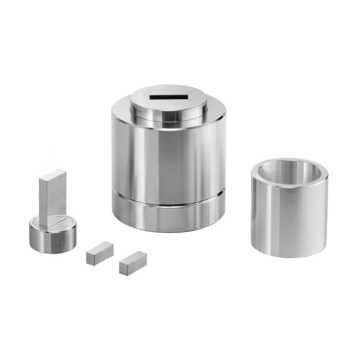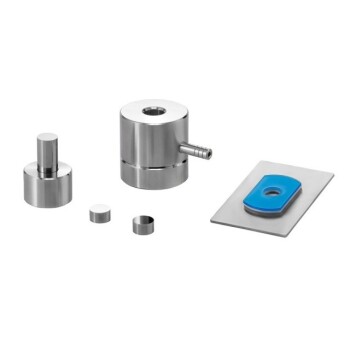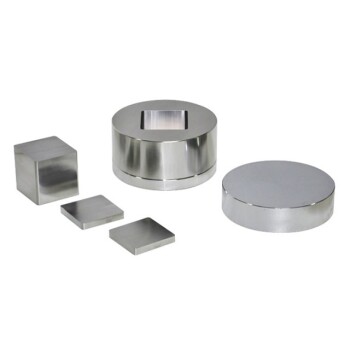At its core, a hydraulic press is a machine that multiplies force, and its two primary applications are large-scale industrial manufacturing and precise laboratory analysis. While these two worlds seem far apart, they are united by the need to apply immense, controlled pressure. One application uses this force to shape the world around us, while the other uses it to understand the materials that make up that world.
The versatility of the hydraulic press stems from a single principle: Pascal's Law. Understanding that this machine is simply a force multiplier explains why it is equally indispensable for stamping massive steel parts in a factory and for preparing tiny material samples in a lab.

Application 1: Industrial Material Processing & Manufacturing
The most common use of hydraulic presses is in industrial settings, where they form, shape, and assemble parts for nearly every major industry. This is where raw power and scale are most visible.
Metal Forming and Shaping
Hydraulic presses excel at manipulating metal. The sustained, even pressure they provide is ideal for operations like forging, stamping, and deep drawing, where metal is forced into a die to create a specific shape.
This process is fundamental to the automotive industry for producing body panels, chassis components, and engine parts. It is also critical in aerospace for shaping high-strength alloy parts like turbine blades.
Compression, Molding, and Compacting
Many materials are formed not by bending but by compression. Hydraulic presses are used to mold plastics and rubber into finished goods or to compact powdered materials into solid forms.
This is essential for creating everything from dense ceramic components to pharmaceutical tablets. In recycling, massive hydraulic presses known as balers are used to compress scrap metal into manageable blocks.
Assembly and Finishing
Beyond forming raw materials, hydraulic presses are used for assembly operations. This includes press-fitting bearings into housings, riveting structural components together, and crimping electrical connectors.
They are also used for finishing tasks like shearing, punching, and cutting metal components with high precision.
Application 2: Laboratory Analysis & Material Testing
On a much smaller scale, hydraulic presses are a cornerstone of scientific laboratories. Here, the emphasis shifts from raw power to precision and repeatability.
Sample Preparation
Many analytical techniques require samples to be prepared in a specific way. For example, in infrared spectroscopy (FTIR), a common technique is to create a thin, transparent pellet by mixing a sample with potassium bromide (KBr) powder and compressing it in a small hydraulic press.
This creates a uniform sample that allows light to pass through for accurate analysis.
Material Strength Testing
Engineers and material scientists must understand the limits of their materials. Hydraulic presses are used to perform compressive strength tests on samples of concrete, ceramics, alloys, and composites.
By applying a measured force until the material fails, researchers can determine its durability and suitability for a specific application, such as a building foundation or a vehicle frame.
High-Pressure Research
Scientific research often involves studying how substances behave under extreme conditions. Hydraulic presses allow researchers to investigate the effects of high pressure on different materials, leading to the discovery of new material phases and properties.
Understanding the Trade-offs
While incredibly versatile, hydraulic presses are not the solution for every task. Their primary strength—immense, controllable force—comes with inherent trade-offs.
Speed vs. Power
Hydraulic presses are generally slower than their mechanical counterparts. While they can deliver constant force throughout the entire stroke, their cycle times are longer. Mechanical presses are often preferred for high-speed, high-volume stamping of simpler parts.
Complexity and Maintenance
A hydraulic system consists of a motor, pumps, pistons, valves, and hydraulic fluid. This complexity means there are more potential points of failure, and maintenance can involve dealing with fluid leaks and replacing seals, which can be more involved than maintaining a mechanical press.
Size and Footprint
The ability to generate massive tonnage often requires a large and heavy machine. While lab presses are compact, industrial-scale hydraulic presses demand significant floor space and a robust foundation to support their weight and operational forces.
Making the Right Choice for Your Goal
Selecting the right equipment depends entirely on your primary objective.
- If your primary focus is high-volume production of simple parts: A mechanical press may offer the speed you need, though a hydraulic press is superior for force-intensive deep drawing.
- If your primary focus is forming complex shapes or working with difficult materials: The consistent force and control of a hydraulic press make it the clear choice.
- If your primary focus is precise, repeatable laboratory work: A dedicated lab-scale hydraulic press is the standard tool for sample preparation and material testing.
Ultimately, the power of a hydraulic press lies in its ability to deliver precisely controlled force for almost any application you can imagine.
Summary Table:
| Application | Key Uses | Industries/Benefits |
|---|---|---|
| Industrial Material Processing & Manufacturing | Metal forming, molding, compacting, assembly | Automotive, aerospace, recycling; high force for shaping parts |
| Laboratory Analysis & Material Testing | Sample preparation, strength testing, high-pressure research | Scientific labs, material science; precision and repeatability for analysis |
Need a reliable hydraulic press for your lab or industrial needs? KINTEK specializes in lab press machines, including automatic lab presses, isostatic presses, and heated lab presses, designed to deliver precise force control and durability for your laboratory applications. Enhance your efficiency and accuracy in material testing and sample preparation—contact us today to discuss how our solutions can benefit your operations!
Visual Guide

Related Products
- Automatic Laboratory Hydraulic Press Lab Pellet Press Machine
- Laboratory Hydraulic Press 2T Lab Pellet Press for KBR FTIR
- Laboratory Hydraulic Press Lab Pellet Press Button Battery Press
- Manual Laboratory Hydraulic Press Lab Pellet Press
- Manual Heated Hydraulic Lab Press with Integrated Hot Plates Hydraulic Press Machine
People Also Ask
- How do hydraulic press machines ensure precision and consistency in pressure application? Achieve Reliable Force Control for Your Lab
- What are the key steps for making good KBr pellets? Master Precision for Flawless FTIR Analysis
- How are hydraulic pellet presses used in educational and industrial settings? Boost Efficiency in Labs and Workshops
- How does a hydraulic press aid in XRF spectroscopy? Achieve Accurate Elemental Analysis with Reliable Sample Prep
- What are the limitations of hand-operated presses? Avoid Sample Compromise in Your Lab



















